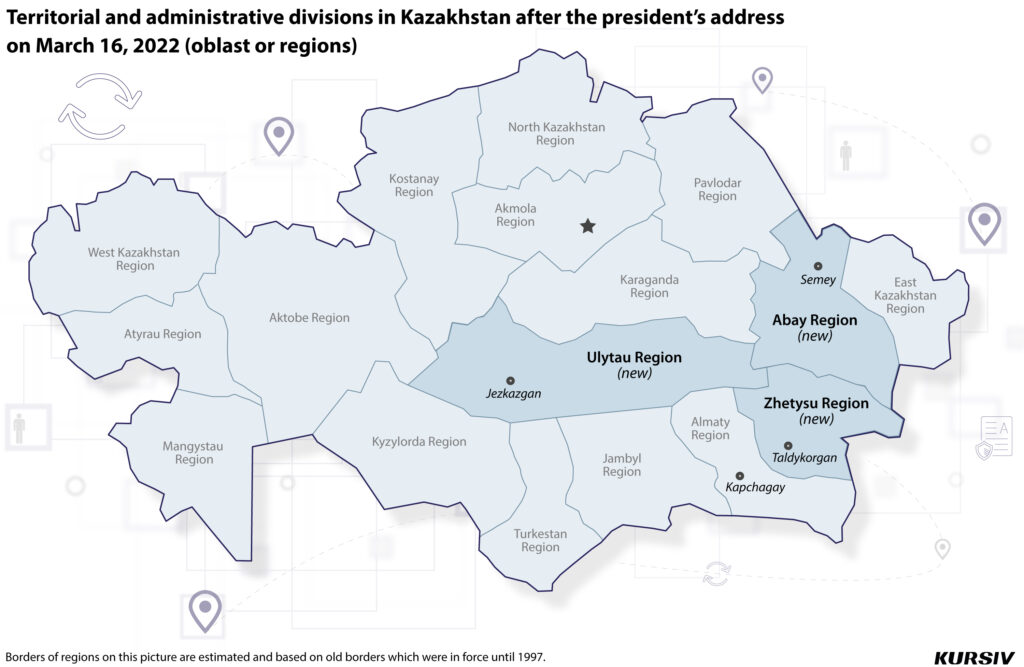New map of Kazakhstan
In the fourth national address, President Kassym-Jomart Tokayev has announced a plan of moderate political reforms. He also mentioned new measures aimed at stabilizing the national economy and ordered the creation of new administrative divisions.
No longer a superpresidency
The part of the address devoted to political reforms was the most intense. Right after the January events, President Tokayev promised to present a complex of new political reforms that may facilitate political competition in the country.
«“We need specific actions to change the political model of Kazakhstan. This is necessary for the further development of the country. We have to make a transition from the superpresidency to a presidential form of government with a strong parliament. This system will provide us with a good balance between public institutions and facilitate sustainable development of Kazakhstan,» Tokayev said.
In this new system, the president is going to stay out of any political party. Tokayev has promised to quit the Amanat party (formerly Nur Otan) before the end of the year. Close relatives of the president will be banned from working at the top level in the public sector or quasi-state entities. Also, the president has abandoned his right to discharge heads of districts, towns and rural districts and to stop orders of regional governors and heads of cities from being implemented.
The president will be able to promote heads of the Constitutional Council and Supreme Court with the consent of the Senate, the upper chamber of the national parliament. The president’s quota in the Senate will decrease from 15 to 10 seats while five seats are going to be recommended by the Assembly of People of Kazakhstan (APK). On the other hand, the APK’s quota in Mazhilis of the parliament must be canceled.
However, even though these changes put some limitations on the power of the president of the country, they are minor changes. The president in Kazakhstan is still the only source of executive power who determines the staff of the cabinet and decides on transfers from the National Wealth Fund.
At the same time, he has gotten rid of extra pillars like a political party’s collegial bodies and waives responsibility for the actions of regional authorities.
Strong parliament
Tokayev wants the political competition to intensify. Political parties must be part of these changes as rules of the race for power in the legislative bodies are also changing. The president has ordered to decrease registration qualifications for political parties. This is what was expected at the very start of his presidency.
«We have to decrease the registration qualification for parties fourfold from 20,000 to 5,000. The threshold of a minimal quantity of party supporters in regions must be decreased from 600 to 200 people. And only 700 individuals instead of 1,000 will be needed to establish a political party,» said the president. The government is also going to increase the time frame for founding congresses (three months instead of two) and creation representative offices in regions (12 months instead of six). These measures will promote the creation of new political parties that would be able to represent different groups of people.
The transition from the proportional representation to a mixed system of forming Mazhilis of the parliament might be another driver for the intensification of political competition. About 30% of the lower chamber members are going to be elected within the majoritarian system when deputies must win in their polling districts. In the proportional system, voters choose not a specific politician but a party that prepares a list of deputies on its own.
Regional legislative bodies (maslikhats) are going to be formed on 50:50 bases. Elections to town and district’s maslikhats will be solely based on the majoritarian system.
Some critics of the president may say that these measures are not enough to ignite political competition. For example, two days before the president’s address political scientists Dimash Alzhanov and Shalkar Nurseitov suggested canceling the minimal member quantity requirement to a party completely. Moreover, Kazakhstan’s legislation prohibits big businessmen and companies from providing financial resources to parties which is the more serious obstacle for the development of political competition. This ban has been in force since the presidency of Nursultan Nazarbayev.
New administrative divisions
While speaking about political changes in the regions, President Tokayev has announced several measures. First of all, he suggested introducing a model where the president promotes two candidates for the position of a regional governor. Local maslikhats must choose one of the candidates.

Tokayev has also suggested changing administrative division in the country by splitting the Almaty region into two regions: Zhetysu region with the center in Taldykorgan and Almaty region with the center in Kapshagay. This small town may be renamed in honor of Dinmukhamed Kunayev, a prominent politician of the past. The president has made a hint that he is going to support the rename if people step in with such an initiative. The other two new regions, the Ulytau region with the center in Jezkazgan and the Abay region with the center in Semey must be separated from the Karaganda region and the East Kazakhstan region respectively.
This is nothing more than a restoration of administrative divisions which existed until 1997. Back then (Tokayev worked as a foreign minister of Kazakhstan) there were the Taldykorgan, Jezkazgan and Semipalatinsk regions which functioned as separate divisions before being merged into the Almaty, Karaganda and East Kazakhstan regions.
In 1997, the government had justified the merging of regions with an intention to save money. Now there is no clear explanation at all. While speaking about the separation of the Zhetysu region, Tokayev said that there is a lot of problems in the Almaty agglomeration. Concerning the Ulytau region, he noted that this is important not just because of the economy but in a spiritual sense as well. In the Abay region there are loads of problems with infrastructure, the president said.
As a result of this reform, there will be 20 regions in Kazakhstan, including two cities of the republican subordination and the capital city of Nur-Sultan.
Agriculture in focus
The economic part of the address was much weaker and which was quite expected because the president addressed the economy and public finances several times after the January events. Tokayev takes separate urgent actions on a routine basis.
This time Tokayev just said that the national economy is going through hard times. Nevertheless, there is no reason for panic as the government implements a range of anti-crises measures. In particular, the authorities are trying to keep stable the exchange rate of the tenge, the president noted.
«We have to pay more attention to the increase of export revenues by our state-owned companies. I expect that private subsoil users will sell a significant part of foreign currency they earned within the country,» said Tokayev. Last week the president banned the foreign currency in cash of more than $10,000 from being withdrawn abroad.
Exactly like his predecessor Nursultan Nazarbayev, President Tokayev devoted part of his address to the topics of food security and spring fieldwork. «Events in Ukraine have caused a food price surge. It is quite likely that food prices will hit historic height very soon. Therefore, it is necessary to make everything needed to guarantee spring fieldwork is done in the way it should be. Unfortunately, as far as I know, our farmers are not ready for the sowing campaign because of problems with machinery, fuel and seeds,» he said.
«We have to remember that low precipitation in several of our regions may affect harvest and cause a deficit of forage. We need to cooperate with the farming community to reconsider approaches to public support of the agricultural complex. To prevent shortages and a food price increase, we have to think about how to buy agricultural products by forward prices and stockpile them in public warehouses,» highlighted Tokayev. According to Food Corporation the volume of forward contracts this year has been increased twofold and reached $156.8 million. The Ministry of Agriculture has also increased the volume of credit facilities for farmers twofold to $274.5 million.

